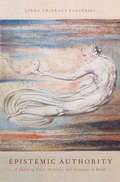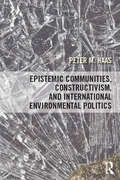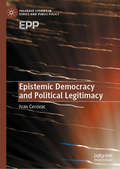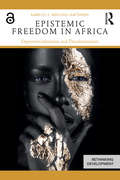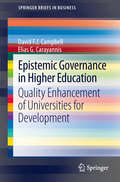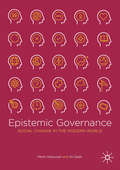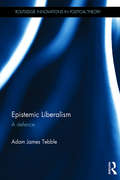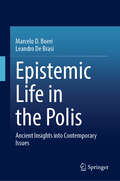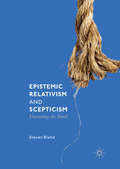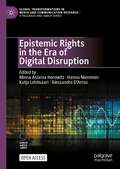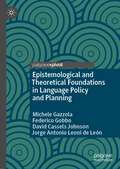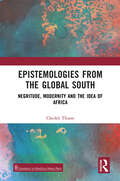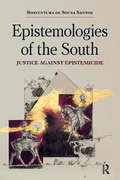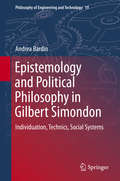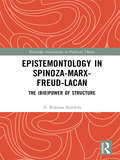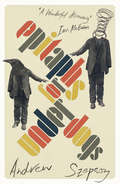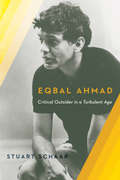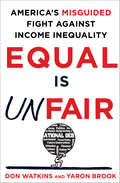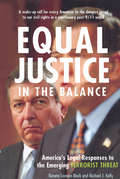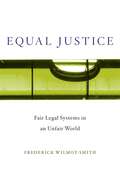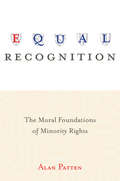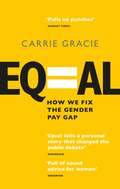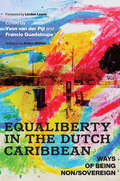- Table View
- List View
Epistemic Authority: A Theory of Trust, Authority, and Autonomy in Belief
by Linda Trinkaus ZagzebskiIn this book the author gives an extended argument that the self-reflective person is committed to belief on authority. Epistemic authority is compatible with autonomy, but epistemic self-reliance is incoherent.
Epistemic Communities, Constructivism, and International Environmental Politics
by Peter M. HaasEpistemic Communities, Constructivism and International Environmental Politics brings together 25 years of publications by Peter M. Haas. The book examines how the world has changed significantly over the last 100 years, discusses the need for new, constructivist scholarship to understand the dynamics of world politics, and highlights the role played by transnational networks of professional experts in global governance. Combining an intellectual history of epistemic communities with theoretical arguments and empirical studies of global environmental conferences, as well as international organizations and comparative studies of international environmental regimes, this book presents a broad picture of social learning on the global scale. In addition to detailing the changes in the international system since the Industrial Revolution, Haas discusses the technical nature of global environmental threats. Providing a critical reading of discourses about environmental security, this book explores governance efforts to deal with global climate change, international pollution control, stratospheric ozone, and European acid rain. With a new general introduction and the addition of introductory pieces for each section, this collection offers a retrospective overview of the author’s work and is essential reading for students and scholars of environmental politics, international relations and global politics.
Epistemic Democracy and Political Legitimacy (Palgrave Studies in Ethics and Public Policy)
by Ivan CerovacThis compelling new book explores whether the ability of democratic procedures to produce correct outcomes increases the legitimacy of such political decisions. Mapping and critically engaging with the main theories of epistemic democracy, it additionally evaluates arguments for different democratic decision-making procedures related to aggregative and deliberative democracy. Addressing both positions that are too epistemic, such as Epistrocracy and Scholocracy, as well as those that are not epistemic enough, such as Pure Epistemic Proceduralism and Pragmatist Deliberative Democracy, Cerovac builds an innovative structure that can be used to bring order to numerous accounts of epistemic democracy. Introducing an appropriate account of epistemic democracy, Cerovac proceeds to analyse whether such epistemic value is better achieved through aggregative or deliberative procedures. Drawing particularly on the work of David Estlund, and including a discussion on the implementation of the epistemic ideal to real world politics, this is a fascinating read for all those interested in democratic decision-making.
Epistemic Freedom in Africa: Deprovincialization and Decolonization (Rethinking Development)
by Sabelo J. Ndlovu-GatsheniEpistemic Freedom in Africa is about the struggle for African people to think, theorize, interpret the world and write from where they are located, unencumbered by Eurocentrism. The imperial denial of common humanity to some human beings meant that in turn their knowledges and experiences lost their value, their epistemic virtue. Now, in the twenty-first century, descendants of enslaved, displaced, colonized, and racialized peoples have entered academies across the world, proclaiming loudly that they are human beings, their lives matter and they were born into valid and legitimate knowledge systems that are capable of helping humanity to transcend the current epistemic and systemic crises. Together, they are engaging in diverse struggles for cognitive justice, fighting against the epistemic line which haunts the twenty-first century. The renowned historian and decolonial theorist Sabelo J. Ndlovu-Gatsheni offers a penetrating and well-argued case for centering Africa as a legitimate historical unit of analysis and epistemic site from which to interpret the world, whilst simultaneously making an equally strong argument for globalizing knowledge from Africa so as to attain ecologies of knowledges. This is a dual process of both deprovincializing Africa, and in turn provincializing Europe. The book highlights how the mental universe of Africa was invaded and colonized, the long-standing struggles for 'an African university', and the trajectories of contemporary decolonial movements such as Rhodes Must Fall and Fees Must Fall in South Africa. This landmark work underscores the fact that only once the problem of epistemic freedom has been addressed can Africa achieve political, cultural, economic and other freedoms. This groundbreaking new book is accessible to students and scholars across Education, History, Philosophy, Ethics, African Studies, Development Studies, Politics, International Relations, Sociology, Postcolonial Studies and the emerging field of Decolonial Studies.
Epistemic Governance in Higher Education
by Elias G. Carayannis David F. Campbell"Epistemic governance" refers to the cognitive and knowledge-related paradigms that underlie a social system. In this volume, the authors apply the concept to higher education. In a comprehensive review of recent literature, they define key terms and concepts, arguing that a good, effective and sustainable governance of higher education is not possible unless the epistemic structure and knowledge paradigms of higher education are addressed directly. Effective governance of academic institutions is particularly important, given their essential role in generating and disseminating knowledge. The authors consider the practical and policy implications of the epistemic approach for promoting quality assurance, quality enhancement, and quality management of higher education, and their impact on university administration and academic career development.
Epistemic Governance: Social Change in the Modern World
by Pertti Alasuutari Ali QadirThis book argues that modern governance is performed by actors who seek social change epistemically, by drawing on widespread, public views of reality. Agents of change such as parliamentarians or social movement activists will assess and affect what they believe to be people’s conceptions of what is possible, rational, and desirable. This often means that these key authority figures will invest in credible knowledge production, as well as appeal to individual and group identifications, emotions, and values.Alasuutari and Qadir show how this epistemic governance works in three important arenas of social change: parliaments, which debate laws that constitute the bulk of reforms; international organizations that circulate global norms; and social movements and NGOs. Through their analysis, the authors’ detailed, innovative methodology for discourse analysis indicates the utility of epistemic governance as a new paradigm for research into global social change. This book will be of use to students in upper level degree programs who want to design empirical research into social change as well as researchers in sociology, political science and public policy.
Epistemic Liberalism: A Defence (Routledge Innovations in Political Theory)
by Adam James TebbleIn the wake of what has come to be called the ‘cultural turn’, it is often asked how the state should respond to the different and sometimes conflicting justice claims made by its citizens and what, ultimately, is the purpose of justice in culturally diverse societies. Building upon the work of a diversity of theorists, this book demonstrates that there is a distinct ‘epistemic’ tradition of liberalism that can be used to critique contemporary responses to cultural diversity and their underlying principles of justice. It critically examines multicultural, nationalist and liberal egalitarian approaches and argues that an epistemic account of liberalism, that emphasises social complexity rather than cultural diversity or homogeneity, is the most appropriate response to the question of justice in modern culturally diverse societies. Epistemic Liberalism will be of interest to students and scholars of contemporary political theory and philosophy, liberal political theory and the politics of culture and identity.
Epistemic Life in the Polis: Ancient Insights into Contemporary Issues
by Marcelo D. Boeri Leandro De BrasiThis book shows the interesting connections within political epistemology that can be established between ancient approaches and contemporary ones. It stems from the conviction that ancient thought can be brought into discussion with contemporary views. Although the book is not intended as an exegetical work, the authors offer detailed interpretations of ancient philosophers while taking into consideration recent specialized discussions in the scholarship with a focus mainly on the systematic aspects of those philosophers rather than on the historical ones. By exploiting insights of Ancient Greek philosophers, and providing an examination of certain intellectual attitudes and virtues that have both an ethical-political and epistemic dimension, the reader will better understand contemporary issues within political epistemology.
Epistemic Relativism and Scepticism: Unwinding the Braid
by Steven BlandThis book confronts the threats of epistemic relativism and Pyrrhonian scepticism to analytic philosophy. Epistemic relativists reject absolute notions of knowledge and justification, while sceptics claim that knowledge and justification of any kind are unattainable. If either of these views is correct, then there can be no objective basis for thinking that one set of methods does a better job of delivering accurate information than any other set of methods. Philosophers have generally sought to resist these threats by responding to the argument that seems to motivate both positions: the Agrippan trilemma. Steven Bland argues that this is a mistaken strategy. He surveys the most influential responses to the Agrippan trilemma, and shows that none of them succeeds in undermining epistemic relativism. Bland also offers a new, dialectical strategy of challenging epistemic relativism by uncovering how epistemic methods depend on one another for their applications. By means of this novel analysis, the book concludes that there are principled reasons to prefer naturalistic to non-naturalistic methods, even if these reasons do little to ease the threat of scepticism.
Epistemic Rights in the Era of Digital Disruption (Global Transformations in Media and Communication Research - A Palgrave and IAMCR Series)
by Hannu Nieminen Katja Lehtisaari Minna Aslama Horowitz Alessandro D’ArmaThis open-access volume argues that in a functioning democracy, citizens should be equally capable of making informed choices about matters of social importance. This includes citizens accessing all relevant information and knowledge necessary for informed will formation. In today's complex era of digital disruption, it is not enough to simply speak about communication or even digital rights. The starting point for this volume is the need for 'epistemic equality'. The contributors seek to showcase the history and diversity of current debates around communication and digital rights, as precursors for the need for epistemic rights; both as a theoretical concept and an empirically assessed benchmark. The book highlights scholarship via academic case studies from around the world to feature different issues and methodological approaches, as well as similarities in academic and policy challenges across the globe. The goal is to provide an overview of issues that depict challenges to epistemic rights, extract both academic and applied policy implications of different approaches, and end with a set of recommendations for advancing policy-relevant scholarship on epistemic rights. This volume is intended as the first holistic response to an urgent need to address epistemic rights of communication as a central public policy issue, as an academic analytical concept, as well as a central theme for informed public debate. This book is open-access, meaning you have free and unlimited access.
Epistemological and Theoretical Foundations in Language Policy and Planning
by Michele Gazzola David Cassels Johnson Federico Gobbo Jorge Antonio Leoni de LeónThis book advances the growing area of language policy and planning (LPP) by examining the epistemological and theoretical foundations that engendered and sustain the field, drawing on insights and approaches from anthropology, linguistics, economics, political science, and education to create an accessible and inter-disciplinary overview of LPP as a coherent discipline. Throughout the book, the authors address LPP from different perspectives, exploring the interface between planning in theory and its practical problems in implementation. This volume will be of interest to students and scholars with an interest in LPP in particular, and educational, social, and public policy more broadly.
Epistemologies from the Global South: Negritude, Modernity and the Idea of Africa
by Cheikh ThiamThis book argues that the pervasiveness of the modern paradigm and its corollary, the colonial matrix of power, have led scholars of Negritude to think of Leopold Sedar Senghor’s work either as an anti-thesis to the anti-Blackness constitutive of European modernity or as another manifestation of the West as subject of history. As opposed to this tradition, the book reads Negritude through the prism of endogenous African world views without the filter of the modern Western paradigm.Print edition not for sale in Sub Saharan Africa.
Epistemologies of African Conflicts
by Zubairu WaiThis book offers a bold, ground-breaking epistemological critique of the dominant discourses on African conflicts. Based on a painstaking study of the ways in which the Sierra Leone civil war has been interpreted, it considers how Africa is constructed as a site of knowledge and the implications that this has for the continent and its people.
Epistemologies of the South: Justice Against Epistemicide (Epistemologies of the South)
by Boaventura De SantosThis book explores the concept of 'cognitive injustice': the failure to recognise the different ways of knowing by which people across the globe run their lives and provide meaning to their existence. Boaventura de Sousa Santos shows why global social justice is not possible without global cognitive justice. Santos argues that Western domination has profoundly marginalised knowledge and wisdom that had been in existence in the global South. She contends that today it is imperative to recover and valorize the epistemological diversity of the world. Epistemologies of the South outlines a new kind of bottom-up cosmopolitanism, in which conviviality, solidarity and life triumph against the logic of market-ridden greed and individualism.
Epistemology and Political Philosophy in Gilbert Simondon
by Andrea BardinThis combination of historiography and theory offers the growing Anglophone readership interested in the ideas of Gilbert Simondon a thorough and unprecedented survey of the French philosopher's entire oeuvre. The publication, which breaks new ground in its thoroughness and breadth of analysis, systematically traces the interconnections between Simondon's philosophy of science and technology on the one hand, and his political philosophy on the other. The author sets Simondon's ideas in the context of the epistemology of the late 1950s and the 1960s in France, the milieu that shaped a generation of key French thinkers such as Deleuze, Foucault and Derrida. This volume explores Simondon's sources, which were as eclectic as they were influential: from the philosophy of Bergson to the cybernetics of Wiener, from the phenomenology of Merleau-Ponty to the epistemology of Canguilhem, and from Bachelard's philosophy of science to the positivist sociology and anthropology of luminaries such as Durkheim and Leroi-Gourhan. It also tackles aspects of Simondon's philosophy that relate to Heidegger and Elull in their concern with the ontological relationship between technology and society and discusses key scholars of Simondon such as Barthélémy, Combes, Stiegler, and Virno, as well as the work of contemporary protagonists in the philosophical debate on the relevance of technique. The author's intimate knowledge of Simondon's language allows him to resolve many of th e semantic errors and misinterpretations that have plagued reactions to Simondon's many philosophical neologisms, often drawn from his scientific studies.
Epistemontology in Spinoza-Marx-Freud-Lacan: The (Bio)Power of Structure (Routledge Innovations in Political Theory)
by A. Kiarina KordelaA. Kiarina Kordela steps beyond extant commentaries on Marx’s theory of commodity fetishism—from A. Sohn-Rethel to L. Althusser, É. Balibar, Slavoj Žižek, and others—to show that in capitalism value is the manifestation of the homology between thought and being, while their other aspect—power—is foreclosed and becomes the object of biopower. Using monistic Marxian/Lacanian structuralism as an alternative to dominant models from Plato and Kant to phenomenological accounts, deconstruction, and other contemporary approaches, Kordela expertly argues that Marx’s theory of commodity fetishism is a reformulation of the Spinozian thesis that thought (mind) and things (bodies or extension) are manifestations of one and the same being or substance. Kordela’s link between Spinoza and Marx shows that being consists of two aspects, value and power, the former leading to structuralist thought, the latter becoming the object of contemporary biopower. Epistemontology in Spinoza-Marx-Freud-Lacan intervenes between two dominant lines of thought in the reception of Marx today: on the one hand, an approach that relates Marxian thought to psychoanalysis from a Hegelian/dialectical perspective and, on the other hand, an approach that links Marxism to Spinozian monism, at the total exclusion of psychoanalysis.This book will interest scholars and researchers who study Marxism, (post)structuralism, psychoanalysis, critical theory, ontology, epistemology and theories of representation, theoreticians of cultural studies and comparative literature, aesthetic theory, including the relation of art to economy and politics, and biopolitics.
Epitaphs for Underdogs
by Andrew Szepessy'A wonderful discovery' (Ian McEwan), this is a beguiling dystopian tale of a young man confronted with the truth about freedom. On a hot summer night, a young man sits in a dark cell in a Hungarian prison. The guards do not explain why he is here; he does not know if he will ever be released. But he is far from alone. Others, too, are trapped within the stone walls - singers and students, sages and spies. As the days pass, the man is drawn into their conversations and their lives, and soon becomes a witness to their sometimes outlandish acts of rebellion.Written in the early 1980s and inspired by Andrew Szepessy's own experiences, Epitaphs for Underdogs is a beguiling and exhilarating novel about power, justice and freedom, and about the solidarity that can be found in even the most unexpected places.'Beautiful... With its sense of the absurd, its laughter in the dark, it belongs in the great tradition of dystopian literature, with echoes of early Kundera and Nabokov' IAN McEWAN
Eqbal Ahmad
by Stuart SchaarEqbal Ahmad (1930?-1999) was a bold and original activist, journalist, and theorist who brought uncommon perspective to the rise of militant Islam, the conflict in Kashmir, U.S. involvement in Vietnam, and Cold War geopolitics. A long-time friend and intellectual collaborator of Ahmad, Stuart Schaar presents in this book previously unseen materials by and about his colleague, having traveled through the United States, India, Pakistan, western Europe, and North Africa to connect Ahmad's experiences to the major currents of modern history. Ahmad was the first to recognize that former ally Osama bin Laden would turn against the United States. He anticipated the rapidly shifting loyalties of terrorists and understood that overthrowing Saddam Hussein would provoke violence and sectarian strife in Iraq. Ahmad had great compassion for the victims of the proxy wars waged by the leading Cold War powers, and he frequently championed unpopular causes, such as the need to extend the rights of Palestinians and protect Bosnians and Kosovars in a disintegrating Yugoslavia. Toward the end of his life, Ahmad worked tirelessly to broker a peace between India and Pakistan and to prevent the spread of nuclear weapons throughout the subcontinent. As novel and necessary as ever, Ahmad's remarkable vision is here preserved and extended to reveal the extent to which he was involved in the political and historical conflicts of his time.
Eqbal Ahmad: Critical Outsider in a Turbulent Age
by Stuart SchaarEqbal Ahmad (1930?–1999) was a bold and original activist, journalist, and theorist who brought uncommon perspective to the rise of militant Islam, the conflict in Kashmir, the involvement of the United States in Vietnam, and the geopolitics of the Cold War. A long-time friend and intellectual collaborator of Ahmad, Stuart Schaar presents in this book previously unseen materials by and about his colleague, having traveled through the United States, India, Pakistan, western Europe, and North Africa to connect Ahmad's experiences to the major currents of modern history.Ahmad was the first to recognize that former ally Osama bin Laden would turn against the United States. He anticipated the rapidly shifting loyalties of terrorists and understood that overthrowing Saddam Hussein would provoke violence and sectarian strife in Iraq. Ahmad had great compassion for the victims of the proxy wars waged by the leading Cold War powers, and he frequently championed unpopular causes, such as the need to extend the rights of Palestinians and protect Bosnians and Kosovars in a disintegrating Yugoslavia. Toward the end of his life, Ahmad worked tirelessly to broker a peace between India and Pakistan and to prevent the spread of nuclear weapons throughout the subcontinent. As novel and necessary as ever, Ahmad's remarkable vision is here preserved and extended to reveal the extent to which he was involved in the political and historical conflicts of his time.
Equal Is Unfair: America's Misguided Fight Against Income Inequality
by Yaron Brook Don WatkinsWe’ve all heard that the American Dream is vanishing, and that the cause is rising income inequality. The rich are getting richer by rigging the system in their favor, leaving the rest of us to struggle just to keep our heads above water. To save the American Dream, we’re told that we need to fight inequality through tax hikes, wealth redistribution schemes, and a far higher minimum wage.But what if that narrative is wrong? What if the real threat to the American Dream isn’t rising income inequality—but an all-out war on success?In Equal is Unfair, a timely and thought-provoking work, Don Watkins and Yaron Brook reveal that almost everything we’ve been taught about inequality is wrong. You’ll discover:• why successful CEOs make so much money—and deserve to• how the minimum wage hurts the very people it claims to help• why middle-class stagnation is a myth• how the little-known history of Sweden reveals the dangers of forced equality• the disturbing philosophy behind Obama’s economic agenda.The critics of inequality are right about one thing: the American Dream is under attack. But instead of fighting to make America a place where anyone can achieve success, they are fighting to tear down those who already have. The real key to making America a freer, fairer, more prosperous nation is to protect and celebrate the pursuit of success—not pull down the high fliers in the name of equality.
Equal Justice in the Balance: America's Legal Responses to the Emerging Terrorist Threat
by Michael J. Kelly Raneta Lawson MackWith its sweeping critique of the USA Patriot Act and the Bush administration's maneuvers in pursuit of terrorists, Equal Justice in the Balance is a sobering and exacting look at American legal responses to terrorism, both before and after 9/11. The authors detail wide-ranging and persuasive evidence that American antiterrorism legislation has led to serious infringements of our civil rights. They show us how deviations from our fundamental principles of fairness and justice in times of heightened national anxiety-whether the Red Scare, World War II, or the War on Terrorism-have resulted in overreaction and excess, later requiring apologies and reparations to those victimized by a paranoia-driven justice system. While terrorist attacks-especially on a large scale and on American soil-damage our national pride and sense of security, the authors offer powerful arguments for why we must allow our judicial infrastructure, imperfect as it is, to respond without undue interference from the politics of anger and vengeance.
Equal Justice: Fair Legal Systems in an Unfair World
by Frederick Wilmot-SmithIt cannot be fair that wealthy people enjoy better legal outcomes. That is why Frederick Wilmot-Smith argues that justice requires equal access to legal resources. At his most radical, he urges us to rethink the centrality of the market to legal systems, so that those without means can secure justice and the rich cannot escape the law’s demands.
Equal Recognition: The Moral Foundations of Minority Rights
by Alan PattenConflicting claims about culture are a familiar refrain of political life in the contemporary world. On one side, majorities seek to fashion the state in their own image, while on the other, cultural minorities press for greater recognition and accommodation. Theories of liberal democracy are at odds about the merits of these competing claims. Multicultural liberals hold that particular minority rights are a requirement of justice conceived of in a broadly liberal fashion. Critics, in turn, have questioned the motivations, coherence, and normative validity of such defenses of multiculturalism. In Equal Recognition, Alan Patten reasserts the case in favor of liberal multiculturalism by developing a new ethical defense of minority rights.Patten seeks to restate the case for liberal multiculturalism in a form that is responsive to the major concerns of critics. He describes a new, nonessentialist account of culture, and he rehabilitates and reconceptualizes the idea of liberal neutrality and uses this idea to develop a distinctive normative argument for minority rights. The book elaborates and applies its core theoretical framework by exploring several important contexts in which minority rights have been considered, including debates about language rights, secession, and immigrant integration.Demonstrating that traditional, nonmulticultural versions of liberalism are unsatisfactory, Equal Recognition will engage readers interested in connections among liberal democracy, nationalism, and current multicultural issues.
Equal: How we fix the gender pay gap
by Carrie Gracie'Gracie tells the story of her struggle and eventual triumph as a way of encouraging us, of changing our society, of giving us all courage . . . Equal is a very important book' Sandi ToksvigEqual pay has been the law for half a century. But women often get paid less than men, even when they're doing equal work.Mostly they don't know because pay is secret. But what if a woman finds out? What should she do?In Equal, award-winning journalist Carrie Gracie covers her own experience of holding her employer - the BBC - to account and investigates why we're still being paid unequally. Equal will open your eyes, fix your resolve and give you the tools to act - and act now.'Equal tells a personal story that changed the public debate' Guardian'Pulls no punches' Sunday Times'Full of sound advice for women' Observer'A gripping personal story told with warmth and wit' Julia Gillard, former Australian Prime MinisterLonglisted for the Financial Times Business Book of the Year Award 2019
Equaliberty in the Dutch Caribbean: Ways of Being Non/Sovereign (Critical Caribbean Studies)
by Antonio Carmona Báez Rose Mary Allen Francio Guadeloupe Yvon Van Pijl Nikki Mulder Jordi Halfman Guiselle Starink-Martha Lisenne Delgado Francisca Grommé Gregory Richardson Charissa Granger Nicole SanchesEqualiberty in the Dutch Caribbean is a collection of essays that explores fundamental questions of equality and freedom on the non-sovereign islands of the Dutch Caribbean. Drawing on in-depth ethnographic research, historical and media analysis, the study of popular culture, and autoethnographic accounts, the various contributions challenge conventional assumptions about political non/sovereignty. While the book recognizes the existence of nationalist independence movements, it opens a critical space to look at other forms of political articulation, autonomy, liberty, and a good life. Focusing on all six different islands and through a multitude of voices and stories, the volume engages with the everyday projects, ordinary imaginaries, and dreams of equaliberty alongside the work of independistas and traditional social movements aiming for more or full self-determination. As such, it offers a rich and powerful telling of the various ways of being in and belonging to our contemporary postcolonial world.
